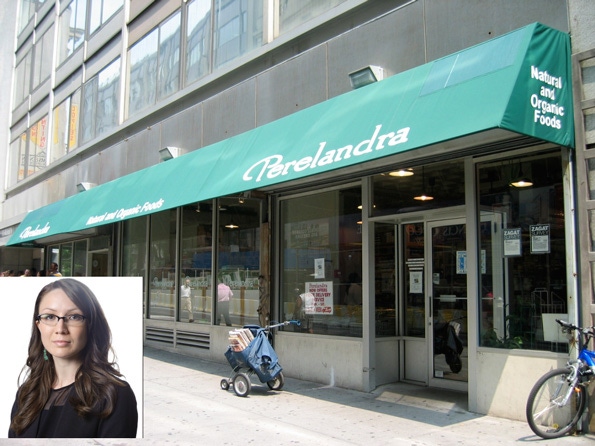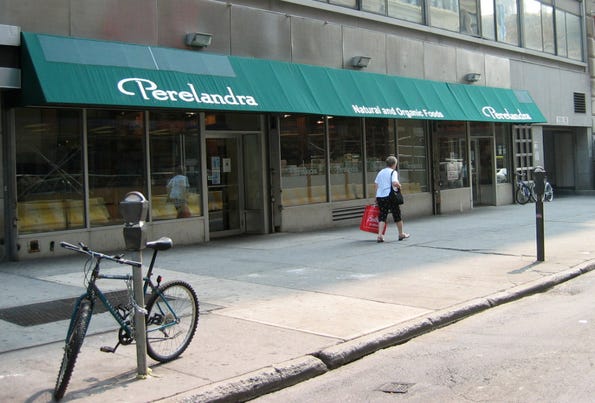April 23, 2015

Allison Buckingham started as a cashier at Perelandra Natural Food Center in Brooklyn, New York, in 2002, the day after she moved to New York City for college. “I’d been vegan for a long time and thought a natural foods store would be a good fit for me,” Buckingham says. “I was right.” Before long, she was promoted to general manager, and then in 2010, Buckingham, along with founders Steve and Madeline Hoose and manager Roland Auer, became a co-owner of Perelandra. Today, the team works hard to stay true to the values that the store was founded on in 1976, while also being innovative and forward-thinking enough to thrive in a competitive, crowded urban neighborhood.
What are the store’s strongest attributes?
Allison Buckingham: All of our departments are strong. We don’t do something unless we think we can do it exceptionally well. But if I had to call out something specifically, I’d say we have an amazing produce department—which we are well known for—because we sell only certified-organic produce. We also have a juice and smoothie bar and a vegetarian kitchen that is a destination for organic prepared foods in Brooklyn.
What specific challenges do you face as an inner-city store?
AB: To make it long-term in New York City, you have to be better than everyone else. There is so much competition that you have to truly set yourself apart in notable, valuable ways. Space is also a great challenge for a city store. Real estate is expensive in our neighborhood, and you have to be creative in organizing your space. We’ve seen lots of independent businesses close and be replaced with chains or condos.
Who are your customers?
AB: Our store is a true microcosm of New York City in that our customers come from all over the city and all over the world. We have many customers who live or work in our immediate neighborhood, but we also have regulars who come from Staten Island, Queens and even Westchester.
What are your shoppers’ main concerns and questions?
AB: There’s a lot of misinformation about GMOs and their labeling, as well as gluten-free foods and diets. We are constantly asked about these topics. Our customers are well educated and want to know everything they can.
What do you provide on the education front?
AB: We do a lot in terms of educating our staff. We have a very comprehensive training program that all staff members must go through before they start working in any customer-facing position. I am a New York state–licensed certified nutritionist, and I developed an extensive natural food and nutrition training program. We’d love to do more with customer education, but we just don’t have the space to devote to it.
How do you build community in the aisles and beyond?
AB: We’ve been in business for 39 years, so we are an institution in Brooklyn at this point. We strongly encourage customer engagement and sponsor many events in our neighborhood. Also, we truly want our staff to be involved in our community.
What concerns you about the industry right now?
AB: I’m concerned about huge food conglomerates buying smaller natural companies, which is happening more and more. Many of these acquisitions result in a major clash of values, and that makes it tough because we want to sell products made by companies whose values align with ours. We’ve responded to this by really focusing on carrying products that are made locally and by people who are committed to quality.
What excites you about this industry?
AB: There’s a much greater focus on non-GMO products than ever before, and that’s exciting for us. In 2011, we started requiring that corn, soy, canola and beet ingredients in new products be either certified organic or non-GMO. This is our effort to reduce the number of GMO-containing products in our store.

Three tips for thriving in an urban neighborhood
Follow Allison Buckingham’s lead
Evaluate your space often. “Look critically at your store setup and how it impacts the customer experience on a regular basis,” Buckingham says. “Be flexible enough to make changes quickly if something isn’t working well anymore. In the past two years, we’ve renovated three sections of our store. These revamps have resulted in a better, easier shopping experience—and have increased sales.”
Talk to your customers regularly. “It’s important to stay in touch with what your customers really want in order to keep them coming in,” Buckingham says. “Ask them what you’re doing well, what they’d like to see done differently and if there’s anything that they’d like you to carry. Always let them know that you value their opinion.”
Get your staff out in the community. “Since we’ve been around for 39 years, we are an institution in Brooklyn at this point, so we truly want our staff to be involved in our community,” Buckingham says. “We know it’s hard for them to find the time to volunteer, so we offer our employees up to 24 hours per year of paid time off to volunteer at any New York City-based nonprofit.”
About the Author(s)
You May Also Like
.png?width=700&auto=webp&quality=80&disable=upscale)




